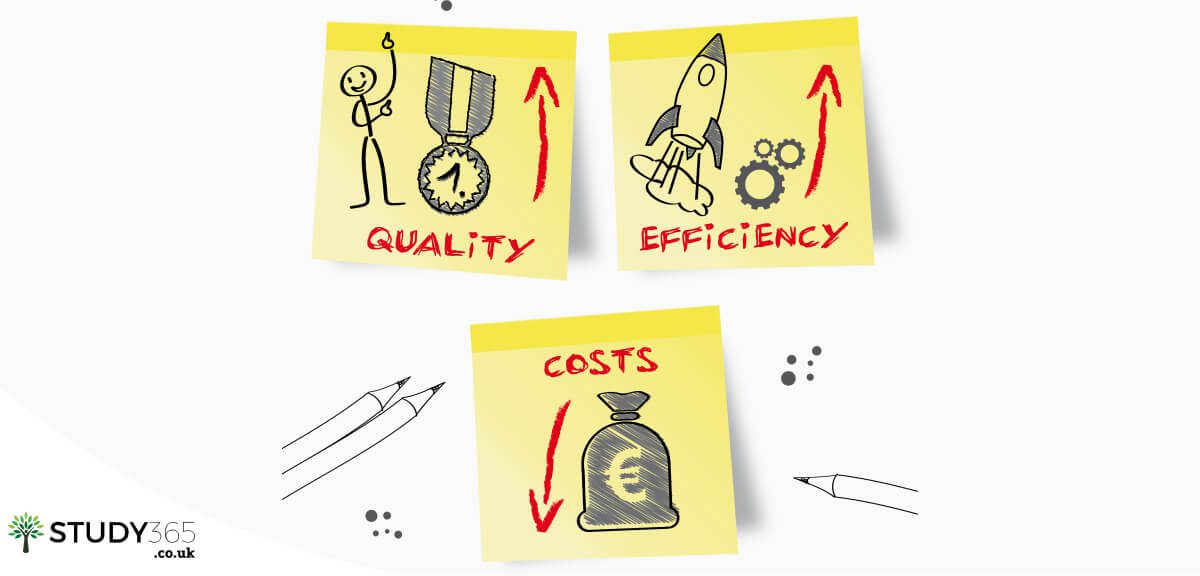Five powerful benefits of project management

Many organizations have realized the importance of project management and are placing it among their core business competencies. Project management is an impressive concept that helps businesses organize and manage the work and people involved in a project.
Why is project management important?
In a nutshell, project management is important because it ensures that a project is run smoothly without any unexpected problems. It also sets clear objectives, helps team members stay on track, ensures quality control, and satisfies project stakeholders.
But that’s not all. In addition to the above, the following are five of the most powerful benefits of project management:
1. Higher efficiency
Efficiency is one of the most renowned benefits of project management. It refers to undertaking something in a manner such that there is maximum productivity with little to no wastage of resources. To begin with, project management offers a work-breakdown structure. It involves breaking down a project into small and manageable components noting hierarchy, objectives, measurable milestones, etc. The distinct tasks in these components are then assigned to individual team members while briefing them about their allocated resources and task completion dates. This creates accountability and pushes them to be responsible for their work. With all involved participants being made aware of their roles, work will likely be completed at a quicker pace, increasing efficiency.
Further, project management generally uses a process-based methodology such as the one used in PRINCE2 Practitioner certification training, making it easier to follow. This also adds more regularity to projects leading to higher efficiency.
Lastly, project management takes into account hazards that may arise during the project (see point 2: Risk mitigation). By being prepared in advance, resources are not wasted unnecessarily for crisis management, adding to increased efficiency.
2. Risk mitigation
Risk mitigation is the process of identifying, evaluating, and avoiding or minimizing the impacts of risks associated with a project. Risks may appear in the form of technological, legal, and operational issues, market risks, and natural disasters among others. Project management analyses the impact a risk may have on project resources, completion time, quality, and deliverables. Understanding and preparing for the impact of such risks can reduce the damage they may potentially cause to a project. Moreover, having this data at hand will enable a project manager to make swift decisions in times of crisis. Project management software also allows stakeholders and other interested parties to receive updates in real-time. Failure to account for risks a project manager may increase the timeline of a project, and lead to a scarcity of resources.
3. Better quality
The whole purpose of project management is to create an end product of superior quality. Applying project management principles includes enforcing quality standards throughout the various stages of a project. Project management tools can be used to create quality checklists, conduct regular quality checks and also store the data for future reference. Abiding by these steps increases the likelihood of an end product that exceeds client expectations.
Strong project management also leads to higher productivity among team members resulting in improved quality of deliverables. Additionally, following a process-oriented methodology such as the one taught in the PRINCE2 Practitioner online course provides a pathway for added innovation ultimately leading to high-quality end products.
4. Continuous data collection
Using project management tools, data is constantly collected from all team members regarding task progress, expenses, delays, quality checks and hazards. There also exists software that can be utilized to track the individual progress of team members. All of this information together can be used by project managers to track the overall status of projects and to identify potential deviations. The data can also be used to compare the current progress of a project at a given time versus what was originally intended.
Further, project managers will be able to generate quick data sheets and status reports to appease stakeholders. The importance of accurate and organized data in a project cannot be emphasised enough. For example, data is needed by project managers to make strategic business decisions, conduct research, and even as a reference for future projects.
5. Guaranteed customer satisfaction
Last but not least, the most powerful benefit of project management is customer satisfaction. Project management involves creating a very clear vision of what the client requires. During this stage, clients are requested to clearly state their required project objectives and expectations. A project plan is then structured and shown to the client to seek approval. Henceforth, a project manager can begin assigning tasks as he knows precisely what the client is looking for.
Moreover, all of the tools in project management are put to use to ensure optimal use of the allocated resources to conclude the project. Obtaining exactly what a client requires while not going over budget, and not causing unnecessary delays results in guaranteed customer satisfaction. As a bonus, a highly satisfied client is likely to rehire your organization for future projects.
In today’s corporate world, project management isn’t just a project manager’s job. Mid-level seniority employees are assigned to handle complex tasks. While working in a team will also benefit from project management by signing up for the PRINCE2 Practitioner online course and official exam.


0 responses on "Five powerful benefits of project management"